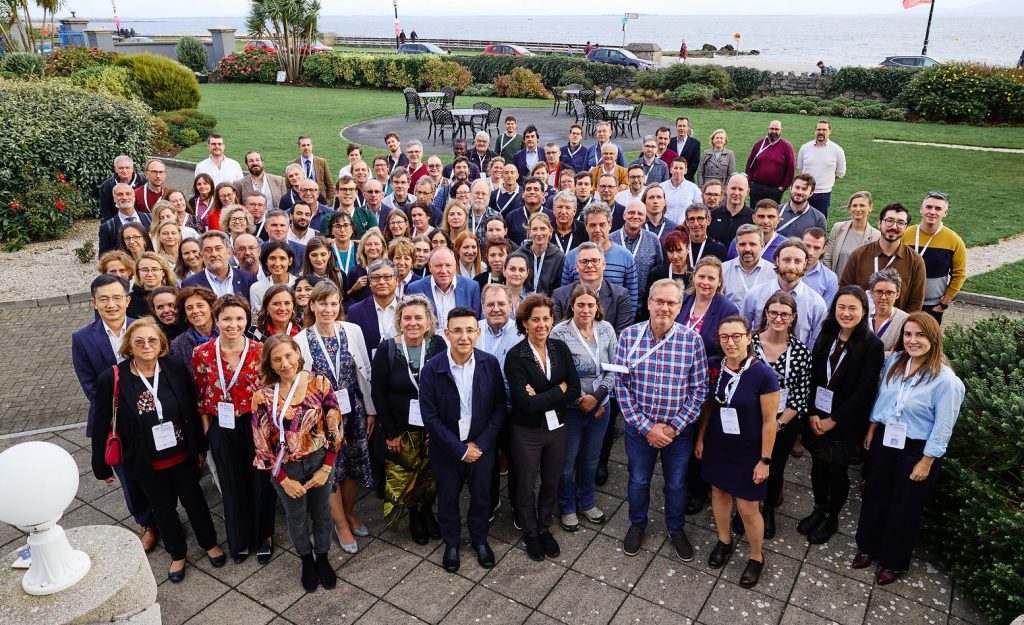 From 3 to 5 October 2023, EuroGOOS held its 10th International Conference, hosted in Galway by the Marine Institute, Ireland. The Conference, titled European Operational Oceanography for the Ocean we want – Addressing the UN Ocean Decade Challenges, was an endorsed Ocean Decade event.
From 3 to 5 October 2023, EuroGOOS held its 10th International Conference, hosted in Galway by the Marine Institute, Ireland. The Conference, titled European Operational Oceanography for the Ocean we want – Addressing the UN Ocean Decade Challenges, was an endorsed Ocean Decade event.
The event brought together over 160 participants for an in-person Conference covering all aspects of operational oceanography and its societal relevance. The Conference was opened by the Interim CEO of the Marine Institute Michael Gillooly, Executive Secretary of the Intergovernmental Oceanographic Commission of UNESCO Vladimir Ryabinin, Director for Maritime Policy & Blue Economy at the European Commission DG MARE Delilah Al Khudairy, and Head of Unit Healthy Seas and Ocean at the European Commission DG Research and Innovation Elisabetta Balzi.
The Conference Statement, summarizing the conference presentations and discussions, leads EuroGOOS and its large community in the coming years. The Statement puts forward the following key messages and recommendations:
- Operational oceanography in Europe must develop with a holistic Earth system approach. The operational oceanography value chain must be better connected to those of other environmental domains (terrestrial, hydrological, atmospheric, cryospheric, climate, etc.) as well as socio-economic information systems. This must be a focus of effort, while simultaneously continuing to strengthen the ocean-specific capabilities that are the core of the European operational oceanography community.
- Without observations, ocean services and products are not possible. Ocean observations play a vital role in delivering essential marine services and products relied upon by users in Europe and worldwide, including forecasts, data products, and model outputs on a daily basis. The continued development of the European Ocean Observing System (EOOS) as the Europe-wide coordinated system to observe the ocean is a collective ambition of the highest priority. Sustainability (in all regards, including resourcing and environmental impact) is key to the long-term prospects of coordinated ocean observing in Europe.
- Genuine co-design of operational oceanography with users and stakeholders is needed to ensure their needs are met. For operational oceanography to be fit for purpose and truly meet societal needs, stakeholder engagement, and co-design of the system with users from the outset must become the standard practice. Only through properly planned and resourced (funds and time) engagement and co-design activities, including iterative review according to new and emerging needs, can operational oceanography fully deliver its benefits to Europe and the world. Ocean Literacy is a key component, without which co-design and stakeholder engagement cannot reach their full potential.
- There is no operational oceanography without people – the skilled individuals without whom there would be no ocean observations, infrastructure and data management, or forecasts and services. Observing platforms or data by themselves cannot deliver the ocean knowledge, products and services Europe needs. Providing adequate resources to the human capacities is key. Enhanced training and education are needed, along with opportunities to ensure operational oceanography is an attractive career path, whether in a scientific, technical, managerial, or other domains.
- Boost and demonstrate the value of operational oceanography to all stakeholders across the marine knowledge value chain. Understanding of the value of ocean observing and operational oceanography must not be taken for granted. Communication, awareness raising, and the demonstration of economic value are needed to strengthen the case for observations. These are an essential part of Europe’s efforts to meet the needs of users in the blue economy and deliver on climate and biodiversity targets.
Full Statement is available below:
The post EuroGOOS International Conference Statement appeared first on EuroGOOS.


















